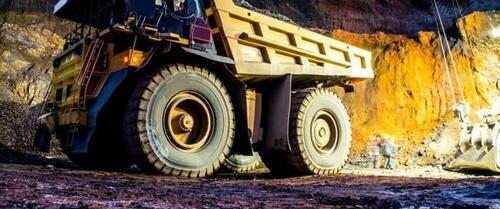Authored by Felicity Bradstock via OilPrice.com,
-
Europe is looking to boost its domestic production of rare earth metals to reduce reliance on China and enhance energy security.
-
Norway has discovered Europe's largest deposit of rare earth metals, which could be crucial for the development of renewable energy technologies.
-
Sweden has also made significant discoveries of rare earths, indicating potential for increased European production.
Europe has been looking for ways to accelerate its rare earth metals production to diversify its supply chain and reduce reliance on China as its main supplier. Several minerals will be crucial for the development of the global renewable energy industry, helping energy companies to produce batteries, solar and wind equipment and clean technologies. To date, the global reliance on China for these minerals has been significant and it continues to dominate worldwide production of lithium and several other critical minerals. However, recent developments could help Europe boost the regional production of critical metals and minerals to strengthen its supply chain and boost energy security during the green transition.
Global mining activities are increasing year on year as energy companies and governments invest heavily in the extraction of lithium, cobalt, nickel and other critical minerals to support the green transition. These minerals are needed for renewable energy components, as well as in most of our everyday electronic devices. As the world reduces its coal mining activities, mineral mining is expanding at a rapid pace that is set to continue. The global demand for critical metals and minerals is expected to rise from around 7.5 million tonnes in the 2020s to 28 million tonnes by 2040, according to the International Energy Agency.
Ten countries dominate critical mineral mining, with China, Russia, Chile and the Democratic Republic of Congo at the top. Due to the heavy dependence on critical minerals to drive a global green transition, the EU decided not to stop importing minerals from Russia, despite introducing a ban on oil and gas imports following the Russian invasion of Ukraine. However, the EU’s main source of minerals continues to be China, which supplies around 90 percent of the European mineral market. This is not surprising given that China is responsible for over half of the global processing capacity for lithium, cobalt and manganese.
Thierry Breton, EU Commissioner for the internal market, stated, “Our main concern is excessive dependencies, meaning dependency on a single source of supply.”
Breton added, “When we have such dependencies and Russia is at war, or China bans exports, or there is an earthquake in Chile, we can have a problem. "
Fears of an overdependence on a singular power for Europe’s mineral supply have driven the EU to look closer to home for its rare earths, to strengthen its supply chain. Europe’s mineral mining industry continues to be underdeveloped, but several energy companies are carrying out exploration efforts to assess the potential to develop new mining activities. The EU established its Critical Raw Materials Act with the aim of extracting a minimum of 10 percent of the region’s annual critical mineral demand from within Europe by 2030.
Nonetheless, there are several constraints to the expansion of mineral mining, such as environmental concerns. As companies dig for minerals to support a green transition, environmentalists are worried that this could cause more harm than good unless done sustainably, leading to stricter regulations on mining in the region.
This month, the mining company Rare Earths Norway announced it had discovered Europe’s largest proven deposit of rare earth metals, which it believes could be key to greater diversification of the minerals supply chain. The firm stated that its Fen Carbonatite Complex in the southeast of Norway is home to 8.8 million metric tonnes of total rare earth oxides (TREOs) with a reasonable prospect for economic extraction. These TREOs are seen as vital to the rapid expansion of renewable energy activities and the development of clean technologies. Rare Earths Norway announced there was an estimated 1.5 million metric tonnes of magnet-related rare earths, which are suitable for use in electric vehicles and wind turbines.
Alf Reistad, the CEO of Rare Earths Norway, said that the discovery is a “great milestone” for Rare Earths and added, “It is important to state that there is absolutely no extraction of rare earth elements in Europe today.”
Norway is not the only European country aiming to develop its mineral mining industry with Sweden having announced the discovery of rare earths deposits last year. The state-owned company LKAB found that there were rare earths mixed in with the iron ore it was mining in Kiruna, Sweden's northernmost city. Following initial assessments, the firm announced initial estimates of around 1.3 million metric tonnes of rare earths in the mine. However, drilling is slow work with the company suggesting it could take as long as six or seven years to complete exploration. Once complete, production activities can begin so long as the deposits are deemed viable.
The EU has high hopes for Europe’s rare earth metals market, as several countries across the region invest in exploration activities. New discoveries could help the EU to reduce its dependence on China and Russia for its critical minerals, helping it to diversify its supply chain and enhance energy security during the green transition. However, it will likely take a long time to establish production projects, following several years of exploration and analysis.
